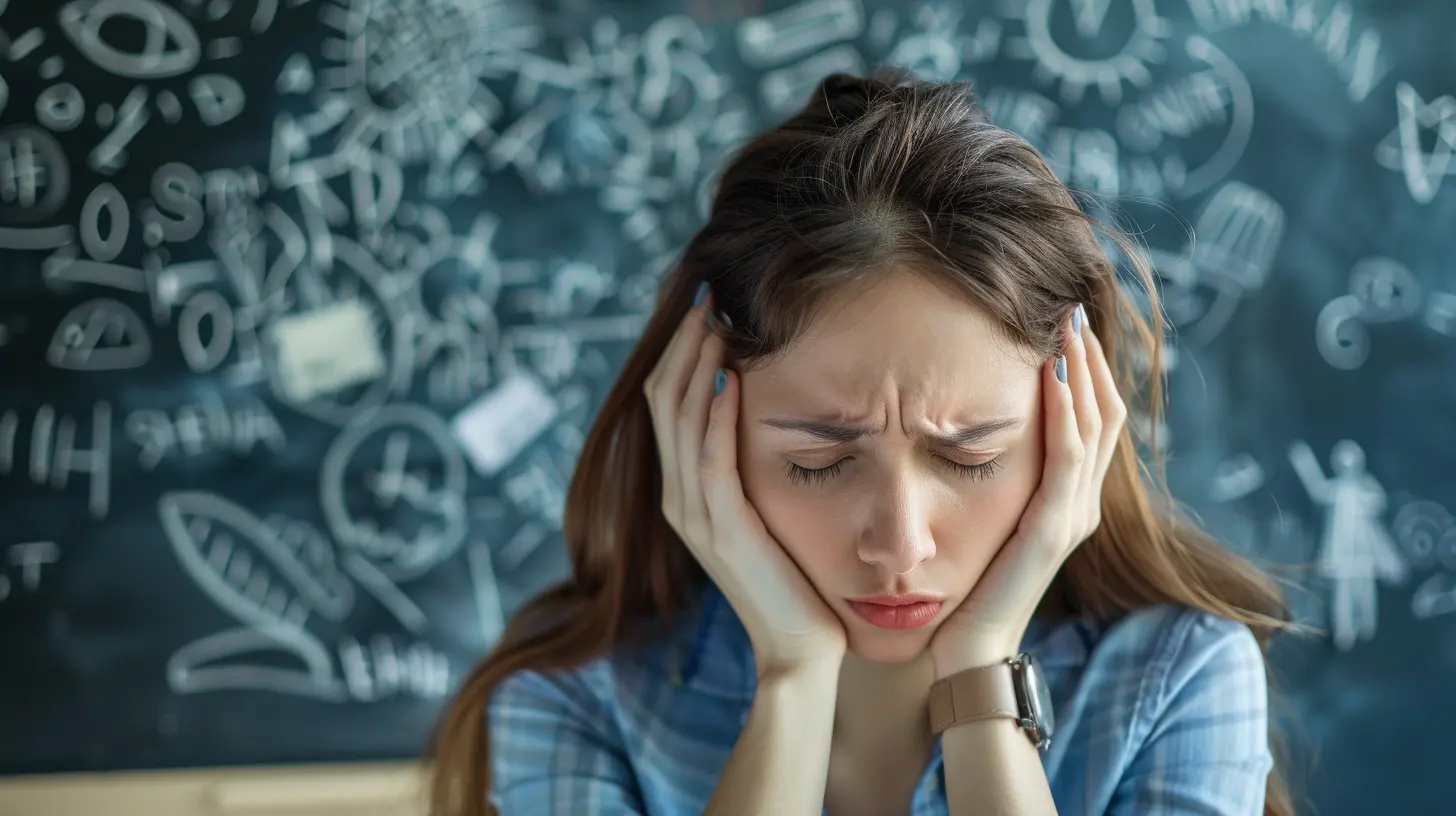Anxiety vs. Stress: Knowing the Difference and Coping Strategies
27 April 2025
We've all felt overwhelmed at some point in our lives. Maybe it's the pressure of an important deadline or the weight of an uncertain future. But how do you know whether you're experiencing stress or anxiety? They often feel the same, but they’re actually quite different. Understanding these emotions is key to managing them effectively. So, let's break it down and figure out how to deal with both in a healthy way. 
Stress vs. Anxiety: What’s the Difference?
At first glance, stress and anxiety seem interchangeable. They both cause worry, tension, and even physical symptoms. However, the main difference lies in the cause and how long they last.What is Stress?
Stress is your body's response to an external challenge or demand. It’s typically temporary and directly linked to a specific situation. Your body kicks into "fight-or-flight" mode, releasing cortisol and adrenaline to help you handle the pressure.Common Causes of Stress:
- Work deadlines- Financial troubles
- Relationship conflicts
- Major life changes (moving, new job, etc.)
- Health concerns
Signs of Stress:
- Feeling overwhelmed or irritable- Trouble sleeping
- Difficulty concentrating
- Muscle tension or headaches
- Upset stomach
Think of stress like a boiling pot: As long as you take it off the heat (resolve the issue), it cools down. But if you let it sit for too long, it can overflow, leading to chronic stress, which can seriously impact your health.
What is Anxiety?
Anxiety, on the other hand, is more than just a reaction to an external challenge. It often persists even when there's no immediate threat. It’s more internal—a constant, nagging feeling of fear or worry that doesn’t always have a clear cause.Common Causes of Anxiety:
- Uncertainty about the future- Perfectionism and fear of failure
- Past trauma or negative experiences
- Generalized fear without a specific trigger
Signs of Anxiety:
- Persistent worry, even in the absence of a stressor- Restlessness or feeling on edge
- Rapid heartbeat or shortness of breath
- Trouble sleeping due to racing thoughts
- Avoidance of certain situations out of fear
Think of anxiety like a car alarm that won’t turn off: Even when there’s no actual danger, your brain continues to sound the alarm, making it difficult to relax. 
When Does Stress Become Anxiety?
Stress can sometimes evolve into anxiety, especially if it’s prolonged or unresolved. If you’re constantly stressed, your brain might start assuming danger is always around, triggering chronic anxiety.Here’s a simple way to look at it:
- Stress is usually short-term and linked to a specific situation.
- Anxiety lasts longer, can be irrational, and isn’t always tied to a single cause.
If stress feels like carrying a heavy backpack for a day, anxiety is like carrying that same backpack for months—you start to feel exhausted, even when you’re standing still. 
How to Cope with Stress and Anxiety
Now that we know the difference, let’s talk about how to manage both effectively.Coping Strategies for Stress
Since stress is usually tied to external factors, the best way to manage it is by tackling the root cause and finding ways to calm your nervous system.✅ Prioritize & Plan
Make a to-do list, break tasks into smaller steps, and set realistic deadlines. Managing your time effectively can prevent stress from building up.🧘 Practice Relaxation Techniques
Deep breathing, meditation, and progressive muscle relaxation can help your body unwind. Something as simple as taking 5 deep breaths can reset your stress response.🚶 Get Moving
Exercise is one of the fastest ways to reduce stress hormones. Even a 10-minute walk can make a difference.😴 Improve Sleep Quality
Lack of sleep makes stress worse. Stick to a bedtime routine, limit screen time before bed, and create a relaxing environment to promote better sleep.🗣️ Talk it Out
Sometimes, venting to a friend, family member, or therapist can provide clarity and relief. Talking about stress can help release some of the pressure.Coping Strategies for Anxiety
Since anxiety is often internal, managing it requires a mix of self-awareness, mindset shifts, and relaxation techniques.🏆 Challenge Negative Thoughts
Ask yourself, Is this fear rational? Many anxious thoughts exaggerate reality. Write them down and counter them with logical responses.🎯 Practice Mindfulness
Anxiety thrives on worrying about the future. Mindfulness helps bring your focus back to the present. Try grounding techniques, like the 5-4-3-2-1 method (identify 5 things you see, 4 you can touch, 3 you hear, 2 you smell, and 1 you taste).🚫 Limit Caffeine & Alcohol
Both can intensify anxiety symptoms. Try replacing coffee with herbal tea and reducing alcohol intake, especially before bed.📖 Journaling
Writing down your worries declutters your mind. Plus, reading back on past entries can help you see patterns and triggers.✨ Practice Self-Compassion
Don’t be too hard on yourself. Anxiety can feel frustrating, but beating yourself up only makes it worse. Treat yourself how you would treat a friend.
When to Seek Help
If stress or anxiety starts interfering with your daily life—affecting your relationships, work, or health—it might be time to seek professional support. Therapy, counseling, or medication (if necessary) can be life-changing for managing intense anxiety or prolonged stress.Some signs you should seek help include:
❗ Persistent anxiety that doesn’t go away
❗ Panic attacks or physical symptoms that disrupt daily life
❗ Avoiding important activities due to fear
❗ Feeling overwhelmed most of the time
There’s no shame in needing help. Mental health is just as important as physical health, and seeking support is a sign of strength, not weakness.
Final Thoughts
Stress and anxiety may seem like close cousins, but understanding the differences empowers you to take control and find the right ways to cope. Stress is usually short-lived, tied to specific situations, and can improve with practical changes. Anxiety, however, lingers, even without a clear cause, and requires deeper strategies to manage.The good news? You’re not alone, and you don’t have to let either of them run your life. With the right approach—whether it’s mindfulness, relaxation techniques, or professional help—you can find balance and regain peace of mind.
So next time you’re feeling overwhelmed, ask yourself: Is this stress or anxiety? Then take the steps to calm your mind and ease the weight on your shoulders. You got this!
all images in this post were generated using AI tools
Category:
Mental Health AwarenessAuthor:

Eliana Burton
Discussion
rate this article
4 comments
Pierce Romero
Understanding the distinction between anxiety and stress is crucial for effective coping. By recognizing their unique traits, we empower ourselves to implement targeted strategies that promote well-being and resilience in challenging situations.
May 6, 2025 at 2:34 AM

Eliana Burton
Thank you for your insightful comment! Understanding the distinctions between anxiety and stress indeed enhances our coping strategies and fosters resilience.
Sarina Richardson
Understanding brings peace; you’ve got this!
May 3, 2025 at 3:43 PM

Eliana Burton
Thank you! Understanding the distinction is key to managing both effectively.
Paige Baxter
Anxiety: the overthinker's gym. Stress: life's surprise pop quizzes!
May 2, 2025 at 3:38 AM

Eliana Burton
Great analogy! Understanding the distinction between anxiety and stress is crucial for effective coping. Thanks for sharing!
Antonia Pruitt
Imagine anxiety and stress as two quirky roommates: anxiety is the overthinker, constantly fretting about what-ifs, while stress is the frantic one, juggling too many tasks and spilling coffee everywhere! Understanding their antics can lead to a calmer, more organized mind. Time for some mental roommate mediation!
April 30, 2025 at 2:42 AM

Eliana Burton
That's a fantastic metaphor! Recognizing anxiety and stress as distinct roommates can lighten the burden and pave the way for effective coping strategies. Let's embrace this mediation for a clearer mind!



